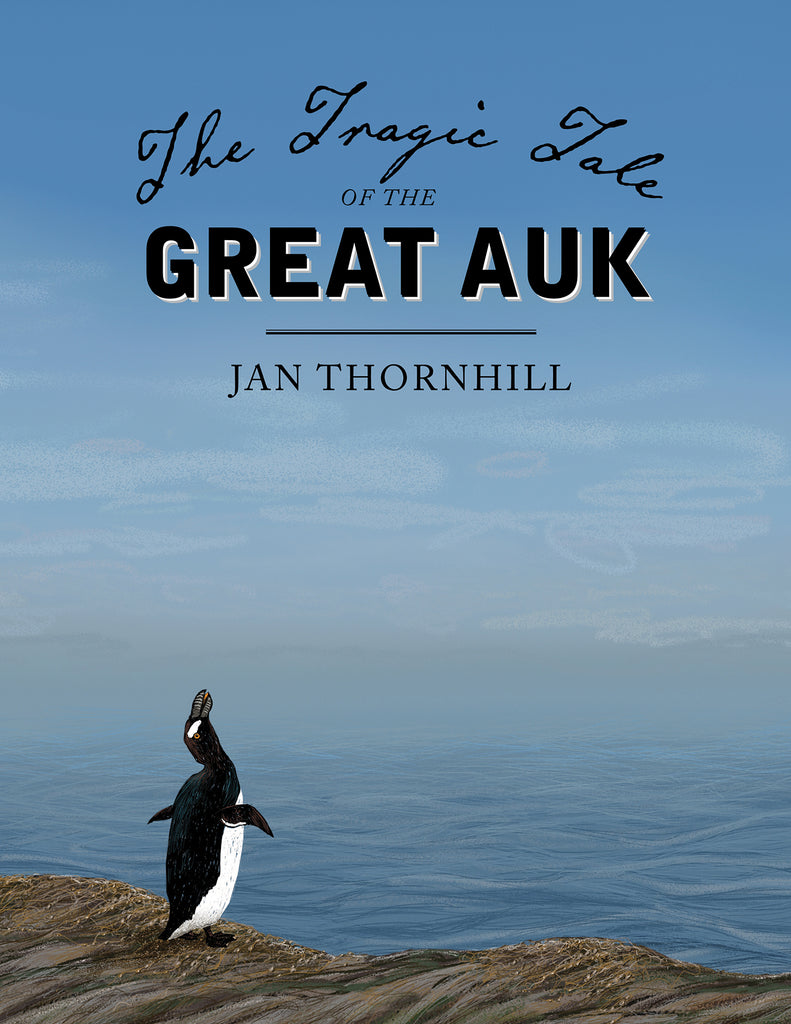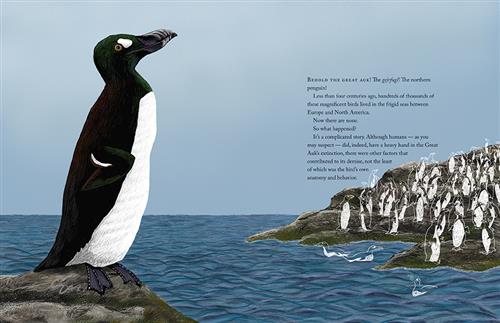For hundreds of thousands of years, Great Auks thrived. And then they were gone …
For hundreds of thousands of years Great Auks thrived in the icy seas of the North Atlantic, bobbing on the waves, diving for fish and struggling up onto rocky shores to mate and hatch their fluffy chicks. But by 1844, not a single one of these magnificent birds was alive.
In this stunningly illustrated non-fiction picture book, award-winning author and illustrator Jan Thornhill tells the tragic story of these birds that “weighed as much as a sack of potatoes and stood as tall as a preteen’s waist.” Their demise came about in part because of their anatomy. They could swim swiftly underwater, but their small wings meant they couldn’t fly and their feet were so far back on their bodies, they couldn’t walk very well. Still the birds managed to escape their predators much of the time … until humans became seafarers.
Great Auks were pursued first by Vikings, then by Inuit, Beothuk and finally European hunters. Their numbers rapidly dwindled. They became collectors’ items — their skins were stuffed for museums, to be displayed along with their beautiful eggs. (There are some amazing stories about these stuffed auks — one was stolen from a German museum during WWII by Russian soldiers; another was flown to Iceland and given a red-carpet welcome at the airport.)
Although undeniably tragic, the final demise of the Great Auk led to the birth of the conservation movement. Laws were eventually passed to prevent the killing of birds during the nesting season, and similar laws were later extended to other wildlife species.
Correlates to the Common Core State Standards in English Language Arts:
CCSS.ELA-LITERACY.RI.4.3
Explain events, procedures, ideas, or concepts in a historical, scientific, or technical text, including what happened and why, based on specific information in the text.
CCSS.ELA-LITERACY.RI.4.4
Determine the meaning of general academic and domain-specific words or phrases in a text relevant to a grade 4 topic or subject area.
For hundreds of thousands of years, Great Auks thrived. And then they were gone …
For hundreds of thousands of years Great Auks thrived in the icy seas of the North Atlantic, bobbing on the waves, diving for fish and struggling up onto rocky shores to mate and hatch their fluffy chicks. But by 1844, not a single one of these magnificent birds was alive.
In this stunningly illustrated non-fiction picture book, award-winning author and illustrator Jan Thornhill tells the tragic story of these birds that “weighed as much as a sack of potatoes and stood as tall as a preteen’s waist.” Their demise came about in part because of their anatomy. They could swim swiftly underwater, but their small wings meant they couldn’t fly and their feet were so far back on their bodies, they couldn’t walk very well. Still the birds managed to escape their predators much of the time … until humans became seafarers.
Great Auks were pursued first by Vikings, then by Inuit, Beothuk and finally European hunters. Their numbers rapidly dwindled. They became collectors’ items — their skins were stuffed for museums, to be displayed along with their beautiful eggs. (There are some amazing stories about these stuffed auks — one was stolen from a German museum during WWII by Russian soldiers; another was flown to Iceland and given a red-carpet welcome at the airport.)
Although undeniably tragic, the final demise of the Great Auk led to the birth of the conservation movement. Laws were eventually passed to prevent the killing of birds during the nesting season, and similar laws were later extended to other wildlife species.
Correlates to the Common Core State Standards in English Language Arts:
CCSS.ELA-LITERACY.RI.4.3
Explain events, procedures, ideas, or concepts in a historical, scientific, or technical text, including what happened and why, based on specific information in the text.
CCSS.ELA-LITERACY.RI.4.4
Determine the meaning of general academic and domain-specific words or phrases in a text relevant to a grade 4 topic or subject area.
| Published By | Groundwood Books Ltd — Oct 1, 2016 |
| Specifications | 44 pages | 8.5 in x 11 in |
| Keywords | birds; nature and the natural world; extinction; endangered species; history; wildlife; conservation; respect for environment; questioning; summarizing; Common Core aligned; CC Literature Key Ideas and Details; grade 4; Kirkus starred review; Booklist starred review; School Library Journal starred review; White Raven Award; Governor General's Literary Award; short list; nonfiction; picture book; glossary; map; labels; scientific nomenclature; references; further reading; |
| Written By |
JAN THORNHILL is an author and illustrator who brings her fascination with the natural world to her books for children. They include The Tragic Tale of the Great Auk (Elizabeth Mrazik-Cleaver Award finalist); I Found a Dead Bird (National Parenting Publications Gold Award, Norma Fleck Award, Children’s Literature Roundtables of Canada Information Book Award); The Wildlife 123 (UNICEF-Ezra Jack Keats International Award, Governor General’s Award finalist) and The Wildlife ABC (Governor General’s Award finalist). Jan has also won the Vicky Metcalf Award. She spends her spare time in the woods obsessively collecting and cataloging wild mushrooms and slime molds. She lives near Havelock, Ontario. |
| Illustrated by |
JAN THORNHILL is an author and illustrator who brings her fascination with the natural world to her books for children. They include The Tragic Tale of the Great Auk (Elizabeth Mrazik-Cleaver Award finalist); I Found a Dead Bird (National Parenting Publications Gold Award, Norma Fleck Award, Children’s Literature Roundtables of Canada Information Book Award); The Wildlife 123 (UNICEF-Ezra Jack Keats International Award, Governor General’s Award finalist) and The Wildlife ABC (Governor General’s Award finalist). Jan has also won the Vicky Metcalf Award. She spends her spare time in the woods obsessively collecting and cataloging wild mushrooms and slime molds. She lives near Havelock, Ontario. |
| Written By |
|
JAN THORNHILL is an author and illustrator who brings her fascination with the natural world to her books for children. They include The Tragic Tale of the Great Auk (Elizabeth Mrazik-Cleaver Award finalist); I Found a Dead Bird (National Parenting Publications Gold Award, Norma Fleck Award, Children’s Literature Roundtables of Canada Information Book Award); The Wildlife 123 (UNICEF-Ezra Jack Keats International Award, Governor General’s Award finalist) and The Wildlife ABC (Governor General’s Award finalist). Jan has also won the Vicky Metcalf Award. She spends her spare time in the woods obsessively collecting and cataloging wild mushrooms and slime molds. She lives near Havelock, Ontario. |
| Illustrated by |
|
JAN THORNHILL is an author and illustrator who brings her fascination with the natural world to her books for children. They include The Tragic Tale of the Great Auk (Elizabeth Mrazik-Cleaver Award finalist); I Found a Dead Bird (National Parenting Publications Gold Award, Norma Fleck Award, Children’s Literature Roundtables of Canada Information Book Award); The Wildlife 123 (UNICEF-Ezra Jack Keats International Award, Governor General’s Award finalist) and The Wildlife ABC (Governor General’s Award finalist). Jan has also won the Vicky Metcalf Award. She spends her spare time in the woods obsessively collecting and cataloging wild mushrooms and slime molds. She lives near Havelock, Ontario. |
| Audience | ages 9 to 12 / grades 4 to 7 |
| Reading Levels |
Lexile 1130L
Guided Reading T |
| Key Text Features | author's note; historical context |
| Common Core |
CCSS.ELA-LITERACY.RI.4.3
CCSS.ELA-LITERACY.RI.4.4 |
Commended, Booklist Top 10 Science & Health Books for Youth, 2016
Commended, SLJ's Best of 2016, 2016
Commended, Booklist Editors' Choice, 2017
Commended, ALA Notable Children's Books, 2017
Short-listed, Elizabeth Mrazik-Cleaver Canadian Picture Book Award, 2016
Long-listed, Green Earth Book Award, 2017
Commended, Bank Street College of Education Best Children's Books of the Year, 2017
Winner, TD Canadian Children's Literature Award, 2017
“A sobering, beautifully presented extinction story.” —Kirkus, STARRED REVIEW
“Accompanied by exquisitely rendered drawings … the text will enthrall and sadden readers, perhaps reminding them that when a species is gone, it has disappeared forever.” —International Literacy Association
“Young environmentalists will certainly be interested in this nonfiction title describing the demise of a species, the Great Auk, the last of which was seen before the start of the Civil War. Thousands of these birds, adept fishers and swimmers, once inhabited the North Atlantic region. The author describes how nature and humans spelled disaster for these creatures that were awkward on land and unable to fly due to their very small wings. Because the Great Auks were so easy to hunt, they provided food for explorers arriving in the area and were often burned for fuel. Eventually, with a reduced habitat and smaller numbers, they became prized for private collections because of their rarity. The author tells the Great Auk’s story in an engaging fashion, identifying turning points from which things could have resulted differently for this species. At the book’s conclusion, Thornhill performs an interesting switch by explaining how the demise of this oddly appealing bird eventually led to the thriving puffin population on Funk Island. Accompanied by exquisitely rendered drawings, created on a computer with Corel Painter, the text will enthrall and sadden readers, perhaps reminding them that when a species is gone, it has disappeared forever.” —Literacy Daily
“This vivid, fascinating story emphasizes not only the importance of conservation but also how deeply intertwined the human and animal worlds can be. Eye-opening and tragic, to be sure, but surprisingly hopeful all the same.” —Booklist, STARRED REVIEW
“The images have an etched and naturalistic quality that adds beauty and an emotional connection to the story of a long-extinct animal. Prose and science come together to highlight the loss of a species and then connect this extinction with modern conservation efforts.” —School Library Journal, STARRED REVIEW
“Thornhill's detailed artwork will attract many readers, as will the engrossing and tragic tale.” —Resource Links
“Thornhill’s approach to this historical event is so advanced it’s simple: she tells the tale … And what a tale it is.” —Bulletin of the Center for Children's Books, STARRED REVIEW
“Thornhill gracefully melds history and science, offering both detail and wit, as well as stirring illustrations that convey both the vast scale of oceans and the delicate patterns of an auk egg.” —The New York Times


